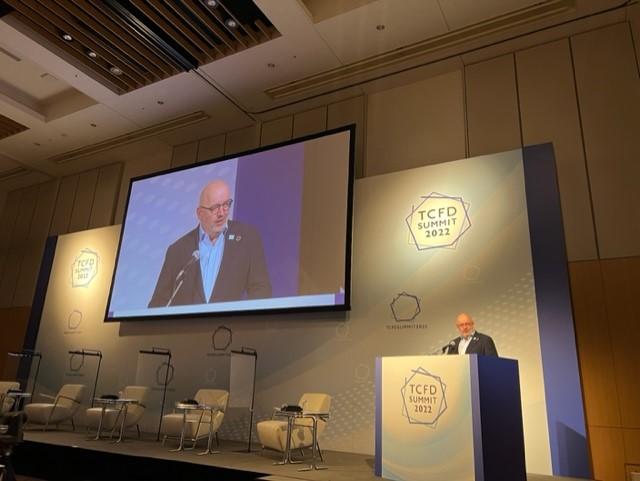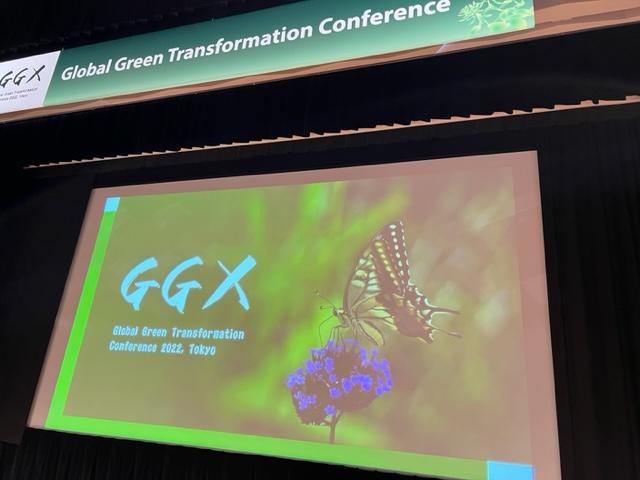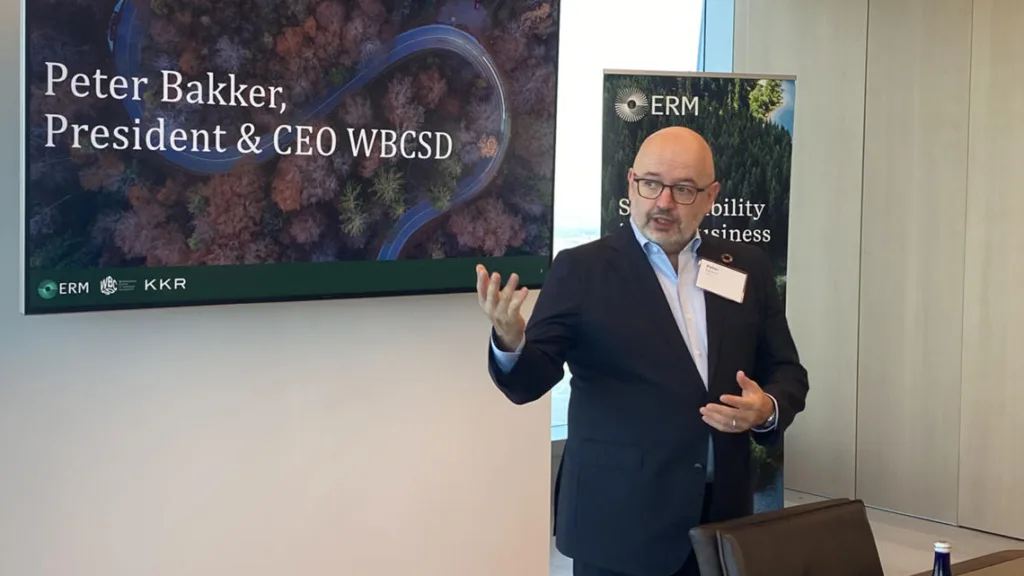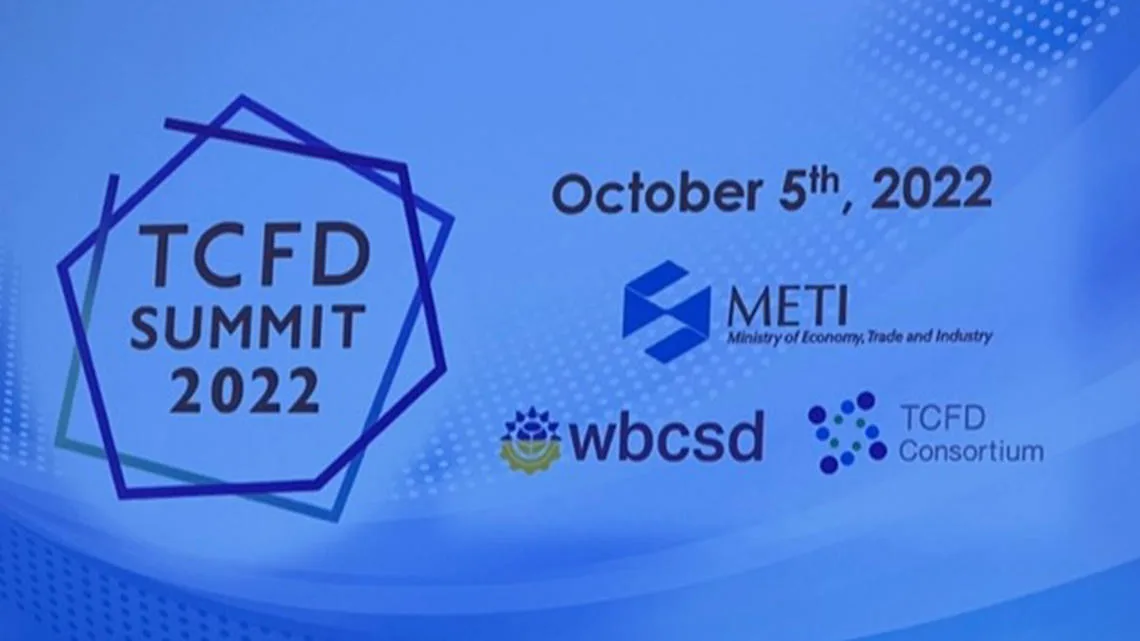Authors
Peter Bakker
Insights from the 2022 Task Force on Climate-Related Financial Disclosures (TCFD) Summit and GGX Conference
I had the privilege to give an opening keynote and closing remarks at the 4th TCFD summit in Tokyo, Japan, earlier this month. During the same trip, I also had the opportunity to participate in the inaugural GGX conference, which was part of an impressive and extensive program of international conferences related to energy and the environment organized by the Japanese government during the same week.
WBCSD has been a partner of the TCFD Consortium since its first summit in 2019 – a summit that has the great convening support of the Japanese Ministry of Economy, Trade and Industry (METI), and that supports the TCFD recommendations becoming business as usual for accelerating the virtuous cycle of environment and growth.

Since the last TCFD summit, we have seen significant progress: the Glasgow Climate Pact was adopted at COP26, the Glasgow Financial Alliance for Net Zero (GFANZ) was launched and the International Sustainability Standards Board (ISSB) was created. Multiple jurisdictions, including Japan, have established formal processes and conversations around national sustainability frameworks.
Standard convergence and collaboration will be critical as frameworks proliferate and cover an increasing range of issues, from Scope 3 emissions to avoided emissions. TCFD has a key role to play in supporting enhanced climate-related disclosure. The development of the TCFD Guidance 3.0 will provide crucial support to companies as they expand their TCFD disclosures.
This past year has emphasized the importance of understanding and responding to climate-related risks as they are directly related to the resilience of supply chains. Ongoing geopolitical conflicts have underlined the importance of decarbonization and low-carbon energy for energy security. Extreme weather events, including flooding and typhoons in Asia and heat waves in Europe, have demonstrated the consequences of unchecked climate change. More governments, like in Japan, have focused on how policy, regulation and finance can provide an enabling environment for business innovation and sustainable solutions.
Overall, I came away from this year’s summit with three key takeaways:
- Identifying, assessing and managing climate-related risks are key competencies for business and investment decision-making. But challenges remain in understanding potential financial impacts and making the connections with the balance sheet, cash flow, and income statement.
- The work of the International Financial Reporting Standards (IFRS) Foundation, ISSB, and their climate exposure draft, addresses the connection gap between climate-related risks and opportunities, financial position and financial performance. That link can flow through to valuation and truly catalyze finance to flow to climate solutions. We must turn ISSB into a global baseline of comparable and materiality-based disclosures.
- We need to move beyond disclosures of climate impacts. For business, the strategic response, pursuit of opportunities, transition planning, investment, and innovation are critical other elements that need to be integrated with the strategic climate scenarios that are part of the TCFD.
We know that banks and investors increasingly focus on transition plans to a low-carbon, climate-resilient future. This transition will require an enormous amount of financing and collaboration. The work and growth of GFANZ are a testament to that. The recently published Real Economy Transition plans provide a helpful framework for the essential components of rigorous transition plans and strategies by companies. The framing from GFANZ calls on companies to disclose low-carbon R&D, CapEx, the provision of low-carbon products and services, and the impact of each low-carbon product or service on achieving GHG emissions targets.
The next big conversation will be on the impact of new Climate disclosures on capital allocation and valuation models. Nomura Asset Management states that focus on innovation / avoided emissions are better indicators for enterprise value than perhaps GHG emissions. While the correlation between green revenue and avoided emissions is clear, we cannot forget that only the reduction of absolute emissions is what will maintain our safe operating space on Planet Earth. However, it is good to note that this TCFD summit has recognized the importance of improving tools like the GHG protocol and scope 3 accounting.
Whatever the final solution, redesigning engagement between companies and the capital markets is the critical lever to accelerate transformation. Companies actively contributing to the green transformation have high growth potential. Still, this potential will only be delivered through a high level of engagement with capital markets to understand the climate transition pathways and accelerate progress by driving down the cost of capital so funding will flow to the most impactful climate solutions.
Right after the TCFD Summit, I attended the Global Green Transformation Conference (GGX), which also took place in Tokyo that week. I gave a keynote speech amongst industry and state leaders like John Kerry (the US Special Presidential Envoy for Climate), Frans Timmermans (Executive Vice-President of the European Commission), and Mathias Cormann (Secretary General, OECD). Additionally, I was involved in numerous panel sessions, discussing the ‘Standards and Evaluations for Promoting Green Products/Services’ and how ‘International Cooperation is needed for a Green Society’.

It was a week focused on the future, powered by impressive Japanese leadership from businesses and the government.
WBCSD will return to Tokyo in October 2022 for our annual Council Meeting, focused on engaging CEOs on “how to” make transformative action on sustainability and value chain collaboration work, for a world in which 9+ billion people will live well within planetary boundaries.
WBCSD news articles and insights may be republished in accordance with the Creative Commons Attribution-NonCommercial-NoDerivatives 4.0 International Public License, and in accordance with our Privacy Policy. All Content must be featured with due credits.
Related
Content

The future of food – How Kraft Heinz is working toward and contributing to a more sustainable food system
17 October, 2023

The Sustainability Buzz: Highlights from a Transformative Week in New York
26 September, 2023

TNFD releases proposed disclosure metrics for the forest sector
19 September, 2023
